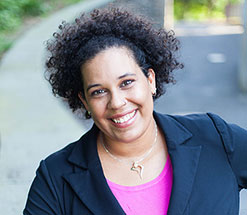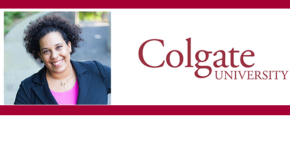 Want to ask a politician a tough question? Good luck.
Want to ask a politician a tough question? Good luck.
Alicia Simmons, associate professor of sociology at Colgate University, explores why it’s difficult to ask hard hitting questions these days.
I’m a social psychologist focused on the intersections of media, race, and politics. I study how the American news media shapes audience members’ racial attitudes and public policy preferences, and how public opinion ultimately shapes the direction of the nation. My research uses quantitative and qualitative methods, including surveys, experiments, and content analysis.
I teach the following courses at Colgate University: Introduction to Sociology, Media Effects, Media and Politics, Black Communities, Race and Crime, and Social Deviance.
Politicians and Dissent
Today, more politicians are avoiding general audiences in favor of handpicked, friendly groups. In doing so, they are prioritizing their rights as speakers over the public’s right to listen and respond.
President Trump rarely participates in press conferences. He avoids town halls. He prefers interacting with friendly news outlets and performing at campaign rallies where ardent supporters line the rows and critics are booed and removed. Interactions with ordinary people who might disagree with him are rare.
Scholars see communication as a process of who says what to whom. Therefore, freedom of expression must concern the rights of the audience. Surely, allowing people to say unpopular things while forbidding anyone to listen violates the principle. Communication is also an interactive process, whereby people act and react to one another.
Audiences fundamentally impact speakers. Friendly listeners do not need a vigorous defense of ideas, but skeptical listeners need more convincing. Friendly audiences give overwhelmingly positive feedback, whereas mixed audiences provide speakers with positive, neutral, and negative responses.
Patterns of listening and responding have implications for speakers’ evaluations of themselves. A lack of dissent reinforces speakers’ confidence in their positions and suggests that their views are widely accepted.
Moreover, widespread depictions of politicians interacting with fawning crowds might lead constituents to misjudge the speaker’s appeal, leading to bandwagon effects that might distract voters from candidates who align with their true interests.
By inoculating themselves from audiences who might disagree with them, politicians are inhibiting the free flow of information and debate. They are elevating their freedom of expression – the right to deliver their messages as comfortably as possible – over the public’s right to listen to and respond.

Comments
One response to “Alicia Simmons, Colgate University – Politicians and Dissent”
Thanks for sharing this post,
is very helpful article.